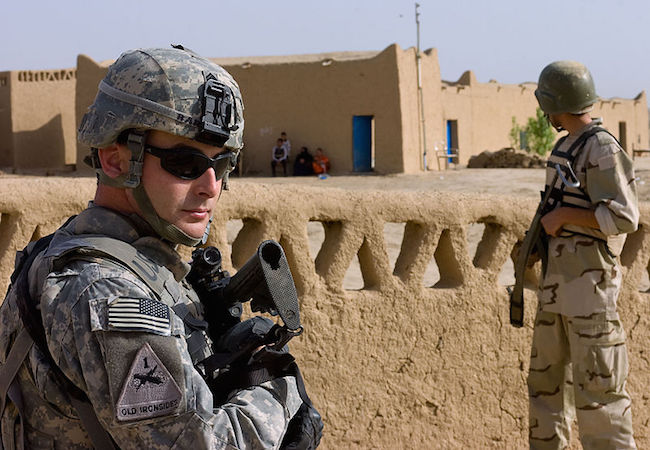End of US global hegemony and dawn of Iranian Empire

By Farhang Faraydoon Namdar
Fall of Kirkuk accomplished the Shiite crescent, putting a big question mark on US hegemon and power in the Middle East. United States is about to be deprived form its interests in the region due to the Shiite crescent which has reached the Mediterranean. US allies no longer seek help from the US but rather Russia! Will US continue its global hegemony or it will return back to the ancient policy of isolationism?
Recently this month Kirkuk fell overnight, there is great likelihood that the some Kurdish factions have vended Kirkuk, however, the Iranian forces took an active role in taking the city using American weapons given to Iraqi forces and surprisingly the US was an onlooker. The Islamic republic of Iran has always raised the motto of anti-Americanism since its birth in 1979. Iran attempts to swallow the whole Middle East and even the greater Middle East. They have rejected to use petro-dollars (US’s economic strength lies in its petro dollar) in their oil businesses and instead they use gold in their bilateral and multilateral trades not to mention Iran is an energy superpower making it a big energy exporter. These attempts would have huge deleterious effects on US-Dollar, declining the US economy in the long run and stifling any sanctions and embargoes imposed on Iran.
Currently Iran has proxies in most Middle Eastern states including, Iraq, Iran, Lebanon, Syria and Yemen, controlling their four capital cities, which have uninterruptedly put US interests in danger. Kirkuk was taken by the Iraqi forces with direct help from Iranian national guards, ending US influences even in Iraq. US has spent more than a staggering two trillion dollars on Iraq War rendering nothing but loss for US. US’s silence is due to their support in the upcoming elections for the Pro-America Iraqi prime minister against his rival Nuri Maliki. Nuri Maliki enervated Iraqi Army during his reign which precipitated in direct Iran intervention especially in the fall of Mosul which was probably a plan devised by Maliki and Iran.
US’s allies form closer ties with Russia, Saudis are purchasing weapons from the Russians, the Israelis are seeking help from Russians to protect their borders, which shows that, US is no longer able to protect its allies.
Even Turkish-American relations are deteriorating, Turkey and the US recognizes YPG as ‘terrorists’ but US aides to YPG continue, however, surprisingly US gave up on the Kurds when the Shiites were taking Kirkuk. The Turks have purchased S-400 without the consent of the US. The Qatar diplomatic crises polarized the Middle East and unwittingly gravitated Turkey closer to Iran. In addition, Qatar has been a loyal and strong economic ally of Turkey, Doha’s three billion of dollar donations to Turkey for compensating their loss of Russian tourism and billions of dollars in the night of failed coup, have saved the Turkish currency from crumbling.US policymaker might think of ending their global hegemony unless they create another Israel, Kurdistan.
Now the US policies are centered at consolidating a united Iraq against Iran, a policy devised by Trump’s national security advisor, McMaster. US paved the way for Iraqi forces to take Kirkuk using American made weaponry, and the reason was for Prime Minister, Abadi, to gain popularity among the Iraqis and thus win in the 2018 general elections. However this policy is more of a bet than a solid policies that can achieve good ends, since Iraq is a polycentric state and domineering is not conducive.
US losses in Vietnam, Afghanistan, Yemen, Lebanon and eventually Iraq and Syria have succumbed US only condemnation and huge financial losses. Moreover, US’s 20 trillion dollar debt which equates to 100 percent of its GDP, US abandoned the Kurds for Iran and it might end its aids to YPG forces soon, since Raqqa was controlled recently.
If US continues its silence on Iran’s action in the region the US hegemony will be might perish drastically, however Donald trump’s intentions to withdraw from the Iranian Nuclear Deal might be a sign that US still wants to protect its influence and interests in the region. A better alternative for McMaster’s plan is to help to create an independent Kurdistan which is innately pro-American and pro-western as well. The Iranian Empire is already in place without possessing nuclear weapon! If Iran possess nuclear weapon in the future then it is likely that Trump’s slogan of ‘America First’ might be US’s 21st century.
Farhang Faraydoon Namdar is an engineer and a student of Politics and International Relations in University of Sulaymaniyah. He has translated books on politics from English to Kurdish. He is an activist and a writer about political situations in Middle East.




